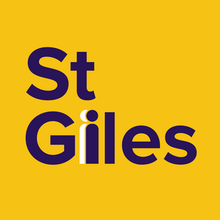St Giles SOS programme at Newham Hospital A&E

St Giles is a charity that uses expertise combined with real-life past experiences to empower people to progress towards a positive future. Their SOS programme, a violence reduction service which works with young people exposed to or at risk of violence, vulnerability and exploitation, has been running at The Royal London Hospital for a number of years. And it is now up-and-running at Newham Hospital’s A&E Department.
“We wanted to come and set up our programme at Newham Hospital because the statistics show that many young people treated in a trauma unit because of violence will have visited an A&E department up to three times before. This could be a reachable moment because we know there’s a lot of good that we could do here, both for staff and the public”, explains Seun Team Leader for the St Giles team based at the hospital.
“With our programme and series of interventions, we aim to reduce the chances of a young person having to visit A&E, or be treated in a trauma unit, as a result of violence again.”
Since starting at Newham Hospital in June 2020, 181 young people have been referred to the St Giles team by Newham Hospital staff, with 69 of them taking up the offer.*
What St Giles offers to patients
This programme offers support to young people who attend A&E with violent injuries, or who disclose potential risks of exploitation or other safeguarding concerns while being treated in the department. The team of caseworkers, who are experts in their field and often draw on personal experience, initially speak to the person when they’re in the department – asking questions about how they got their injuries, if they feel safe or scared etc.
They also offer individuals the opportunity for continued support for up to six months post discharge, which can include guidance, advice and mentorship, or more practical support like help with benefits, housing, or achieving educational and employment goals.
What St Giles offers to staff
Alongside this, the St Giles team provide support and education to the hospital staff.
“We’re on hand to act as a safety net for staff. We will want to speak to the person ourselves, but we want staff to feel empowered to begin conversations and to refer people to our service. Because while we are here very much for the patients, we’re also here for the staff”, explains Seun.
“We want to support them in feeling confident identifying and having conversations with people they feel may be in hospital because of violence or who are at risk. We do this by meeting with the A&E team; offering training sessions on how to spot the signs of someone who may need our help and how to speak to them; and sharing our own lived experiences with them”.
Speaking about what it means to have this programme at Newham Hospital, Dr Claire Kirby, a Consultant in Emergency and Paediatric Emergency Medicine said: “Sadly, we do see a lot of young people who are the victims of violence come through our A&E doors at Newham Hospital. It’s heart-breaking to see and as a healthcare professional, you want to be able to help them as much as possible.
“Having the St Giles team at the hospital who we can refer these young people to, and knowing that doing so will mean they have the chance to get the support and help they need – both immediately and in the longer, term – is very reassuring. It makes me hope that these young people won’t come through our A&E doors again, or worse, in the future. And it’s great that we the staff can learn from the team and develop ourselves, so we can help these young people more and in other ways.”
If you want to learn more about the St Giles programme at Newham Hospital, please contact Seun Sowole or Janayah Douglas
*Timeframe is June 2020 – 31 August 2021
Read more:
